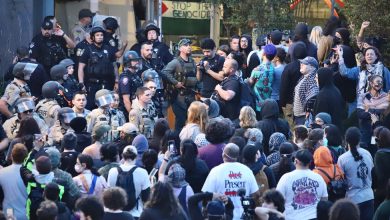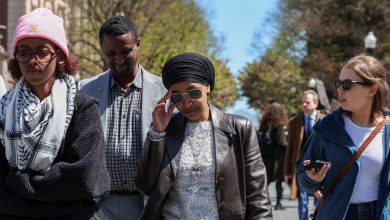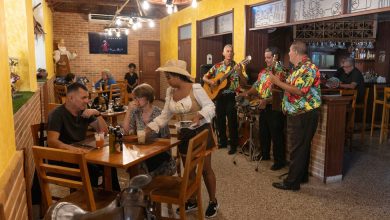Celebrating Black History Month? These 5 Cities are Going All Out

When the historian and journalist Carter G. Woodson proposed the first Negro History Week in 1926, he hardly imagined what would eventually become a monthlong celebration of Black history and culture across the nation. Today, every single state commemorates Black History Month in some fashion, acknowledging the trailblazers of the past, celebrating those making waves in the present, and honoring all the African Americans who have shaped the United States through both triumphs and unimaginable trauma. Below are five cities to explore during Black History Month.
Richmond, Va.
As the former capital of the Confederacy, Richmond is a city that is taking steps to both reckon with the racism of its past and share the rich legacy of Black history and culture that has often been overlooked. This past September, after more than a year of protests supporting the removal of Confederate monuments, the city made headlines when a statue of the Confederate general, Robert E. Lee, was removed from Monument Avenue, the last of six Confederate monuments. While the new home of the statue is still unknown, the Black History Museum & Cultural Center of Virginia, a site that explores the Black experience in Virginia from enslavement to the present day, will work with other area institutions to decide where it will land. BLK RVA, a tourism initiative by Richmond Region Tourism and more than 20 community leaders, is the best resource to understand Richmond’s Black culture each day of the year, but February brings a wide variety of experiences to enjoy.
All month, the Virginia Museum of Fine Arts will showcase both in-person and virtual programming that celebrates African American artists, like the “Jazz Around the Museum” virtual performance on Feb. 10 by the saxophonist James “Plunky” Branch, and the RVA Community Makers Unveiling program — a public art project where local artists will showcase their latest installation — on Feb. 23. Or you can choose to explore powerful street art like the Mending Walls public art project by Hamilton Glass.
On Feb. 20, Black Food & Spirits: Untold will highlight the contributions of Black Virginians to the American food and spirits industry, like the story of James Hemmings, the enslaved chef of Thomas Jefferson who revolutionized traditional colonial cooking after training in France. The event will also include time for shopping at a marketplace of Black-owned businesses.
At the historic St. John’s Church, where Patrick Henry sparked the American Revolution with the phrase “Give me liberty or give me death,” the former Virginia governor L. Douglas Wilder, the first African American elected as governor in the United States, is the first guest in a speaker series hosted by the church foundation on Feb. 24.
Jackson Ward, one of the country’s earliest historically registered Black neighborhoods, was known as the “Harlem of the South” because of its thriving Black businesses and social institutions. Today, the Valentine Museum offers a self-guided tour through the neighborhood that’s home to Black-owned restaurants like Soul Taco and Mama J’s, vibrant murals and the Maggie Lena Walker National historic site, honoring the first woman to serve as a bank president.
Portland, Ore.
Portland, Ore., which The Atlantic magazine once described as “the whitest city in America,” may not be the first place that comes to mind when you think of celebrating Black History Month. Yet Black pioneers were among the earliest non-Native American people to settle in Oregon in the late 18th century, with many moving there as early as 1850. More African-Americans moved to Portland after World War II, and despite encountering intense racism and discrimination, made and continue to make achievements in politics, medicine, the arts and sports.
Today, Portland’s Black community is small but vibrant. The heart of the Black community is locally referred to as the “Soul District” of inner North and Northeast Portland, home to various civic institutions, Black-owned businesses, restaurants and galleries. This month, you can join one of the neighborhood walking tours in Portland led by Word is Bond, a nonprofit created to rewrite the narrative between young Black men and law enforcement through critical dialogue and engagement. Called “In My Shoes,” the 45-minute tours highlight the dreams and experiences of young Black men in the neighborhoods where they live.
Through March 5 check out the Cascade Festival of African Films at Portland Community College, featuring such filmmakers as Shola Amoo, who directed “The Last Tree,” a movie about a British boy of Nigerian descent struggling to come to terms with his identity as Black, British and Nigerian. On Feb. 12, the Portland Trail Blazers N.B.A. team will host their annual Celebration of Black History with a pregame concert.
February 17 is the start of both the NW Black Comedy Festival, which takes place in Northeast Portland, and the PDX Jazz Festival, with performances from the Grammy-winning jazz pianist Robert Glasper and Dezron Douglas, a bassist and composer. On Feb. 12, the Portland-based nonprofit People Of Color Outdoors will host a guided Black History Walk and Talk at Smith and Bybee Lakes. The Meetup community was created in 2017 to provide Black, Indigenous and people of color a welcoming way to enjoy nature in Oregon while learning about the environment.
Philadelphia
Philadelphia has a long, complex relationship with its African American population. Enslaved Africans arrived in Philadelphia in 1684 and continued to arrive for the next 30 years. Yet by 1790, Philadelphia was also home to a sizable population of free African Americans who were drawn there by the Act for the Gradual Abolition of Slavery, passed by the Pennsylvania General Assembly in 1780. The ways to learn and celebrate the city’s Black culture are plentiful. For instance, the February calendar of the African American Museum in Philadelphia is packed with musical performances, films, readings, living history presentations and interactive artistic activities. Other activities range from exploring stops along the Underground Railroad to patronizing nearly 100 Black-owned restaurants, boutiques and bookstores.
On Feb. 12, 19 and 26, the Betsy Ross House will host actor-portrayals of the African American abolitionist Rev. Richard Allen. Mural Arts Philadelphia, the nation’s largest public art program, has created both a virtual and private walking tour of murals in different Philadelphia neighborhoods that represent African American figures of the past and present. The virtual tour includes a portrait of a Mural Arts Philadelphia art student, Najee S., by the artist Amy Sherald, who painted the official portrait of Michelle Obama. There is also a tribute to the Philadelphia world champion boxer, Smokin’ Joe Frazier, created by the artist Ernel Martinez.
The Kimmel Cultural Campus, Philadelphia’s performing arts center, will commemorate Black History Month with both performances and educational programming. On Feb. 18 to 20, the Philly POPS presents Dancin’ In The Streets: The Music of Motown, with performances from the “Hairspray” stars Shayna Steele and Chester Gregory, and the American Idol finalist Michael Lynche.
Cleveland
Cleveland’s African American community is almost as old as the city, which was founded in 1796. The first Black settler arrived in Cleveland in 1809, and by 1860, nearly 800 African Americans lived in the growing community. Between 1890 and 1915, Cleveland was a popular destination during the earliest part of the Great Migration, a mass movement of African Americans from the South who sought better economic opportunities and a less violent daily existence. After World War II, a second wave increased Cleveland’s Black population from 85,000 in 1940 to 251,000 in 1960, a period during which Black entrepreneurs developed restaurants, jazz clubs and more.
The city is known to put on quite the celebration during Black History Month, especially this year as the host of the N.B.A. All Star Weekend on Feb. 18 to 20. The weekend is full of ways to support Black-owned businesses and enjoy basketball-related activities, even if you can’t snag tickets to the official events. On Feb. 19, there’s The Real Black Friday Business Expo at the Tower City Center, featuring more than 100 Black-owned businesses, and the first N.B.A. HBCU Classic game (at Wolstein Center) between Howard University and Morgan State University men’s basketball teams. A Power of Sports Summit will also take place that weekend at the Cleveland Metropolitan Conference Center, addressing topics related to adaptive sports, gender equity, L.G.B.T.Q. athletes, mental health, racial equity and more.
Throughout most of February, the Cleveland Public Theater will perform “Panther Women: An Army for the Liberation,” about the Black Liberation movement from 1965 to 1981, and the Rock & Roll Hall of Fame will host Virtual Fam Jam: Black History Month on Feb. 12, a free digital event of live music, crafts and stories. Karamu House, one of America’s oldest theaters to produce works honoring the Black experience, and a recent grantee from the National Trust for Historic Preservation African American Cultural Heritage Action Fund, will perform Katori Hall’s play “The Mountaintop” Feb. 11 through March 6. The play is a fictional depiction of the night before Dr. King’s assassination. More citywide events throughout the month are listed here.
San Antonio
San Antonio is widely known for its rich Mexican, Native American and Spanish history, but it’s only been in recent years that the city has begun to embrace the Black history that’s been hidden in plain sight. From the Black Canary Islanders forced to live east of the San Antonio River in the 1700s, to Ellis Alley, a Black neighborhood born in the Reconstruction era, Black heritage in San Antonio runs deep.
Thanks to the tenacity of a small group of Black San Antonians who collected and preserved a trove of documents and artifacts, the San Antonio African American Community Archive and Museum (SAAACAM) was formed in 2017 as both a digital archive and physical museum where you can view exhibitions like “Barrier Breakers: Pioneers in Medicine” and “Cherry Street Blues: Black Music History in San Antonio 1867-1937” near the famed River Walk. The East Side neighborhood is the heart of San Antonio’s Black community, home to Ellis Alley, part of the first African American settlement in San Antonio after Emancipation, and St. Paul United Methodist Church, the oldest Black church in the city and a safe haven during the Civil Rights movement.
While much of San Antonio’s Black heritage is rooted in the East Side, Black history will be celebrated across the city this month with a variety of tours, events and exhibitions. Feb. 12 brings the 2nd Annual Black History Month Soul Food Celebration at the Second Baptist Community Center, with guest speakers, live music and of course, soul food. On Feb. 13, SAAACAM will host a Black History River Tour, and on Feb. 28, the Witte Museum will host Untold Stories of the American West, a discussion about Black cowboy culture and history. The event supports the “Black Cowboys: An American Story” exhibition, which explores the lives of the numerous Black men, women and children who labored on the ranches of Texas.
The Carver Community Cultural Center, named after the pioneering Black agricultural scientist Dr. George Washington Carver, offers a range of Black culture-centric performances this month, and the “Spheres of Reflection” sculpture at Martin Luther King Park is a must-see any time of the year.
Follow New York Times Travel on Instagram, Twitter and Facebook. And sign up for our weekly Travel Dispatch newsletter to receive expert tips on traveling smarter and inspiration for your next vacation. Dreaming up a future getaway or just armchair traveling? Check out our 52 Places for a Changed World for 2022.



